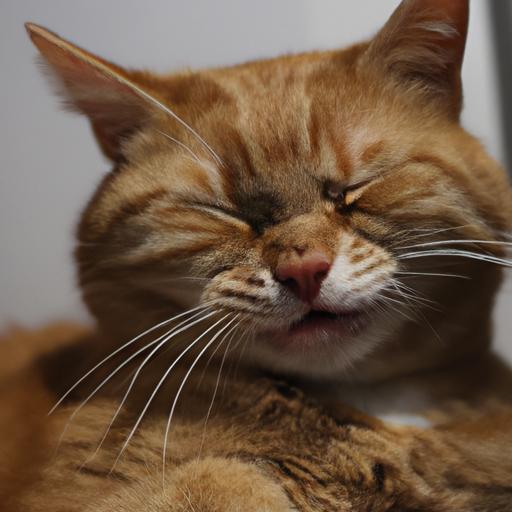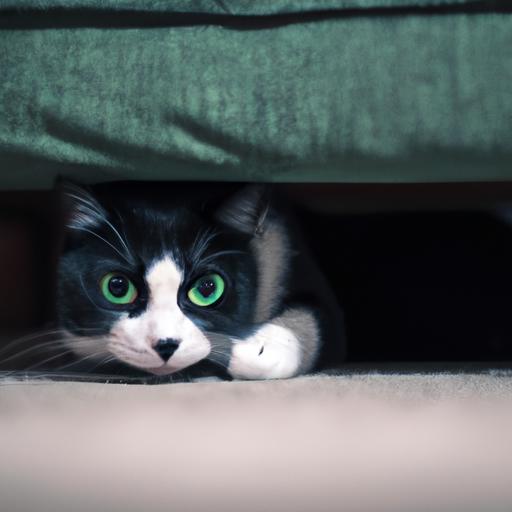Understanding Why Your Cat is Hiding Under the Couch
Introduction
Have you ever wondered why your beloved feline companion seems to disappear under the couch, leaving you perplexed and worried? This common behavior of cats hiding under couches is more than just a mysterious vanishing act. As a cat owner, understanding this behavior is crucial for the well-being of your furry friend. In this article, we will delve into the reasons behind this behavior and explore why it is important to decode the hidden messages your cat is trying to convey.
Cats are known for their innate instinct to seek safety and security. The space under the couch provides them with a cozy and secluded retreat, where they can feel protected from potential threats. By understanding this behavior, you can create an environment that fosters trust and ensures your cat’s overall happiness.
But why do cats choose the couch as their preferred hiding spot? There are several reasons that might explain this behavior. Fear or anxiety triggers, such as loud noises or unfamiliar guests, can prompt your cat to seek refuge under the couch. Additionally, cats are solitary creatures that require privacy and alone time to recharge and relaThe space under the couch offers them the solitude they crave, away from the hustle and bustle of daily life.
It’s essential to recognize the signs that indicate your cat may be hiding under the couch. Sudden changes in behavior or routine, frequent disappearances, and meowing from under the couch are all potential indicators. Keep an eye out for clues such as fur or scratches near the couch, as these might reveal your cat’s secret hideout.
In the following sections, we will explore the underlying reasons for this behavior and provide valuable insights on how to address them. By unraveling the mysteries of your cat’s hiding habits, you can ensure a harmonious and stress-free environment for both you and your furry friend. So, let’s embark on this journey together and discover the fascinating world of cats hiding under the couch. Stay tuned!
Reasons Why Cats Hide Under Couches
Natural Instinct to Seek Safety and Security
Cats have an innate instinct to seek out safe and secure spaces. In the wild, they would hide in concealed areas to protect themselves from predators. This instinct remains strong even in domesticated cats. The space under the couch provides them with a sense of security, allowing them to observe their surroundings while feeling hidden and protected. Understanding this natural behavior can help you create an environment that meets their need for safety and comfort.
Fear or Anxiety Triggers
Just like humans, cats can experience fear and anxiety. Loud noises, such as thunderstorms or fireworks, can send them scurrying under the couch seeking refuge from the perceived danger. Unfamiliar visitors or sudden changes in their environment can also trigger anxiety in cats, prompting them to seek solace in their favorite hiding spot. Identifying and addressing these triggers can help alleviate your cat’s anxiety and provide them with a sense of calm and security.
Need for Privacy and Alone Time
Cats are independent creatures, and they value their alone time. The space under the couch offers them a secluded sanctuary where they can retreat from the world and recharge their energy. It’s essential to respect their need for privacy and not force them out from under the couch. By providing alternative hiding spots or creating designated quiet areas, you can fulfill their need for personal space while still ensuring their well-being.
Health Issues or Discomfort
Sometimes, cats may hide under the couch due to underlying health issues or discomfort. If you notice a sudden change in your cat’s behavior, such as excessive hiding or avoiding interaction, it’s crucial to consult with a veterinarian. Health issues, such as pain or discomfort, can cause cats to seek out hidden spaces where they feel secure. By addressing any potential health concerns, you can help your cat feel more at ease and reduce their need to seek refuge under the couch.
Understanding the reasons why cats hide under couches is the first step in creating a nurturing and stress-free environment for your feline friend. By acknowledging their instinctual behaviors, fears, need for privacy, and addressing any potential health issues, you can ensure their overall well-being and strengthen the bond you share. Let’s continue our exploration in the next section, where we will delve into the signs that indicate your cat may be hiding under the couch.
Signs that Your Cat May Be Hiding Under the Couch
Changes in Behavior or Routine
Have you noticed any peculiar changes in your cat’s behavior or routine lately? One of the telltale signs that your feline friend may be hiding under the couch is a noticeable shift in their demeanor. Cats are creatures of habit, and any sudden alterations in their usual patterns can indicate their secret escapades under the couch. Keep an eye out for unusual behaviors like increased clinginess, decreased appetite, or a sudden aversion to certain areas of your home.
Frequent Disappearance or Unexplained Absences
Does it often feel like your cat has mastered the art of disappearing into thin air? If you find yourself constantly searching for your furry companion without any logical explanation, chances are they have found solace under the couch. Cats are experts at finding cozy hiding spots, and the space beneath the couch provides them with the perfect hideaway. If you frequently find yourself in a cat-seeking mission and your furry friend is nowhere to be found, it’s highly likely they are enjoying their own private retreat.
Meowing or Vocalizing from Under the Couch
Have you ever heard mysterious meows or other vocalizations emanating from beneath the couch? This could be your cat’s way of communicating their desires or seeking attention while hidden away. Cats are known for their unique vocalizations, and if you hear sounds coming from the depths of your couch, it’s a clear indication that your feline friend has claimed that spot as their temporary sanctuary. Pay attention to the tone and intensity of their meows, as it can provide valuable insights into their emotions and needs.
Clues such as Fur or Scratches near the Couch
If you spot tufts of fur or tiny scratches near the edges of your couch, it’s a sure sign that your cat has been utilizing the space beneath it as their personal hideout. Cats often leave behind physical evidence of their presence, inadvertently revealing their secret adventures. Keep an eye out for these subtle clues as they can serve as confirmation that your cat is indeed hiding under the couch.
By recognizing these signs, you can uncover the mystery of your cat’s whereabouts and better understand their need for seclusion. In the next section, we will explore the underlying reasons behind this behavior and provide valuable insights on how to address them effectively. Stay tuned as we unravel the secrets of cats hiding under the couch!
Understanding and Addressing Fear or Anxiety in Cats
Identifying Potential Stressors in the Environment
To tackle your cat’s fear or anxiety, it is crucial to identify the potential stressors in their environment. Cats are sensitive creatures, and even seemingly minor changes can trigger their anxieties. Reflect on recent alterations in their surroundings, such as new furniture, loud noises, or the presence of unfamiliar people or animals. By pinpointing these stressors, you can take proactive steps to alleviate their anxiety.
Creating a Calm and Safe Space for Your Cat
Creating a calming and safe space for your cat is paramount in reducing their fear and anxiety levels. Designate a quiet area in your home where your cat can retreat to when they feel overwhelmed. This space should be equipped with comfortable bedding, toys, and a litter boEnsure that the area is free from disturbances and offers a sense of security. By providing this sanctuary, you give your cat a dedicated space to relax and recharge.
Introducing Calming Techniques such as Pheromone Diffusers or Music
Calming techniques can work wonders in soothing your cat’s anxiety. Consider using pheromone diffusers, which release synthetic pheromones that mimic the natural ones cats produce when they feel safe and secure. These diffusers can create a calming atmosphere and help your cat feel more at ease. Additionally, playing soft and soothing music can have a relaxing effect on cats, reducing their stress levels and promoting a tranquil environment.
Seeking Professional Help if Necessary
If your cat’s fear or anxiety persists despite your best efforts, it may be beneficial to seek professional help. Veterinarians and animal behaviorists possess the expertise to assess your cat’s specific needs and provide tailored solutions. They can guide you in implementing behavioral modifications, recommend appropriate medications if necessary, and offer additional strategies to address your cat’s anxiety effectively.
By understanding and addressing your cat’s fear or anxiety, you can significantly improve their overall well-being. Remember, every cat is unique, and what works for one may not work for another. Be patient, observe their behaviors, and adapt your approach accordingly. With time, patience, and the right techniques, you can help your cat overcome their fears and create a harmonious living environment for both of you.
Promoting a Healthy and Comfortable Environment for Your Cat
Providing Appropriate Hiding Spots or Alternative Hiding Places
Creating a conducive environment for your cat goes beyond just allowing them to hide under the couch. By providing alternative hiding spots, you can give your feline friend more options to feel secure and cozy. Consider adding cat trees, shelves, or enclosed beds in various areas of your home. These elevated spaces not only offer hiding spots but also provide vantage points for your cat to observe their surroundings, satisfying their curious nature.
Ensuring a Clean and Clutter-Free Living Space
Cats are known for their preference for cleanliness, and a cluttered living space can contribute to stress and anxiety. Regularly decluttering and organizing your home can create a serene environment for your cat to roam freely. Keep in mind that cats are masters of squeezing into tight spaces, so make sure to remove any potential hazards or obstructions that could harm or trap them.
Offering Enriching Activities and Mental Stimulation
Cats are intelligent creatures that require mental stimulation to prevent boredom and destructive behavior. Engage your cat in interactive play sessions using toys that mimic prey, such as feathers or laser pointers. Puzzle toys and treat-dispensing toys can also provide mental challenges and keep your cat entertained. Additionally, dedicating time for daily play and bonding sessions helps strengthen the bond between you and your furry companion.
Regular Veterinary Check-ups to Address Any Underlying Health Issues
Sometimes, a cat’s inclination to hide under the couch may be due to underlying health issues or discomfort. Regular veterinary check-ups are essential to identify and address any potential health concerns. Your veterinarian can conduct thorough examinations, perform necessary tests, and provide appropriate treatment if needed. By prioritizing your cat’s health, you can ensure their overall well-being and potentially alleviate any anxiety or discomfort that may be driving them to seek refuge under the couch.
By implementing these suggestions, you can create an environment that promotes your cat’s physical and mental health. Providing appropriate hiding spots, maintaining a clutter-free space, engaging them in enriching activities, and prioritizing regular veterinary care all contribute to a happy and contented feline companion. Remember, a comfortable and secure environment allows your cat to flourish and enjoy their lives to the fullest.
Conclusion
In conclusion, understanding why your cat is hiding under the couch is key to providing a nurturing and supportive environment for your feline companion. By recognizing the reasons behind this behavior, such as the need for security, privacy, or relief from anxiety, you can take appropriate steps to address their needs.
Creating a calm and safe space for your cat, free from stressors, is crucial. Consider introducing pheromone diffusers or soothing music to promote relaxation. Providing alternative hiding spots and enriching activities can also help alleviate their natural instincts and offer them a sense of security.
Regular veterinary check-ups are essential to rule out any underlying health issues that might contribute to their hiding behavior. Remember, your cat’s well-being is paramount, and addressing any discomfort or pain they may be experiencing is vital for their overall happiness.
By fostering a trusting relationship with your cat, you can gradually help them overcome their fears and anxieties. Patience, understanding, and a gentle approach are key to building their confidence.
As cat owners, it is our responsibility to decode the messages our feline friends are trying to convey. By embracing their hiding habits and providing them with the support they need, we can strengthen the bond we share and create a harmonious living environment.
So, the next time you see your cat disappearing under the couch, remember that they’re seeking solace and security. Embrace their need for privacy and give them the space they require. Together, we can unlock the secrets of our cats’ hidden world and ensure their happiness and well-being for years to come.




